jumping the mouse, part 1
[a tail for the holiday]
[Halfway through the composition of this essay, I have realized that it’s going to be the first part of a two-parter, the better for me to allow myself to digress and digress and digress to my heart’s content (and to not run afoul of Substack’s email length limit). And you know how I like to digress.]
Though my relationship with Christmas is purely secular,1 I can always appreciate a rendition of “We Three Kings of Orient Are” or “The First Nowell,” a rereading of Charles Dickens’s magical novella2 A Christmas Carol and/or a reviewing of my favorite film adaptation thereof, the 1951 Alistair Sim version, and especially a rewatching of the 1934 Hal Roach–produced3 Laurel and Hardy operetta March of the Wooden Soldiers, as the film originally titled Babes in Toyland was repeatedly broadcast when I was a young person—and I believe still is broadcast, when I am not a young person—on the WPIX TV station in New York.
As I recall it, possibly accurately or possibly not, March of the Wooden Soldiers turned up two or three times a year: at Eastertime, again at Thanksgiving, and perhaps yet again for Christmas.
However many times it was in fact shown annually, I certainly did my best never to miss it (in those days, to be sure, if one wanted to watch something on television one had to actually be in front of the television at the designated time), and it’s become one of my more benign obsessions.4
March isn’t, I suppose, a particularly Christmasy film, though one of its key plot points is that Ollie Dee (Oliver Hardy’s character, natch) and Stannie Dum (that would be Stan Laurel, natch natch), employed in Toyland’s toyshop by the enthusiastically cantankerous William Burress (pictured below with Ferdinand Munier), have made a mess of Santa Claus’s order for “six hundred soldiers at one foot high” and manufactured “one hundred soldiers at six foot high.”
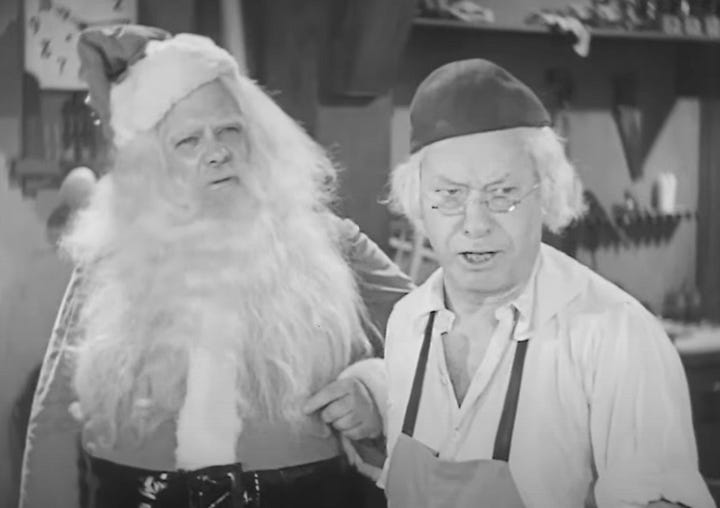
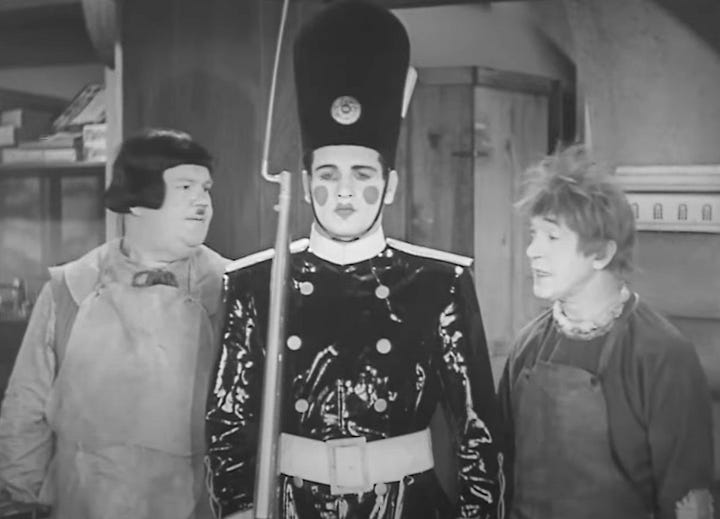
Trouble ensues (and, eventually, via the oversize soldiers, heroic salvation ensues as well). But my point of focus today, such as it is, is . . .
This:
The mouse.
We are told that Walt Disney himself gave Hal Roach permission to borrow Mickey Mouse’s persona, as well as to make clever use of the melody of “Who’s Afraid of the Big Bad Wolf?” in sequences involving the Three Little Pigs.
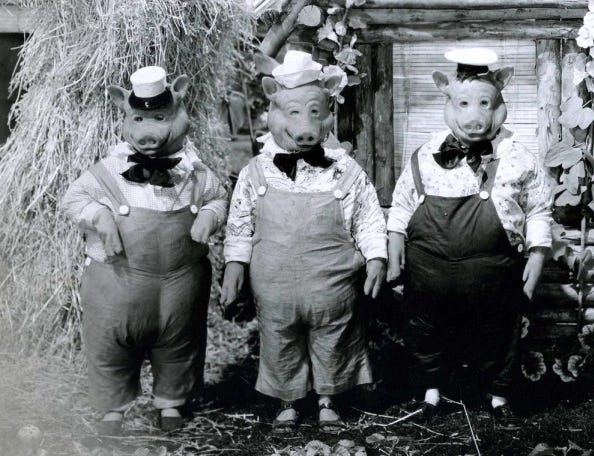

But oh that mouse. It capers, it prances, it rolls about, it feuds with a cat (and the cat’s bass fiddle), it applauds itself. Eventually it hijacks a dirigible and, defending Toyland from the invading Bogeymen (it’s a long story), drops a payload of wee explosive torpedoes on the hairy marauders before it’s inadvertently shot out of the sky and parachutes to safety (no, really, it’s a long story).
My point (oh, right, yes, the point!) is this: It was only on my umpteenth and a half viewing, when I was, I confess, somewhere in my early thirties, that it ever occurred to me to wonder:
What in God’s name is that thing?
Toyland’s mouse had so imprinted itself on my childhood soul that it had never occurred to me to question its identity. It was simply . . . the mouse.
The rest of the figuring-out process went PDQ’ly. After a solidly bemused thirty or so seconds of my contemplating the mouse as some sort of unlikelily wire-free marionette, the simple truth made itself known.
It’s a monkey.
It’s a shockingly talented monkey, with a long and expressive tail,5 and I hope that the wee fellow was well treated (it doesn’t seem to mind being masked and costumed), but on some subsequent viewings, I do think, to paraphrase Greta Garbo’s perhaps legendary exclamation in response to Jean Marais’s being transformed, in his boyfriend Jean Cocteau’s 1946 Beauty and the Beast film, from a menacingly, dashingly hairy creature into, well, Jean Marais:

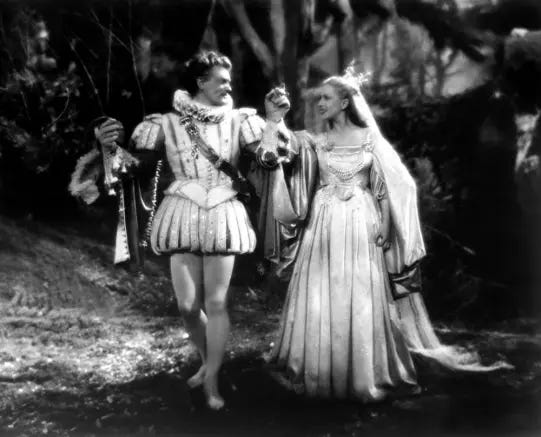
Give me back my mouse!
I’ll return in a few days to conclude this story of blissfully taking things for granted and what happens, wordwise, when one suddenly pauses and wonders:
What in God’s name is that thing?
To be continued . . .
Oh yes. Merry Christmas to all who observe (or who simply observe)!
Benjamin
“Secular” is one of those words whose meaning I always have to double-check, as it immediately presents itself to my mind as “religious,” I suppose because I think it ought to refer to religious sects, when in fact it derives from a Latin word, “saeculum,” meaning “the present world.” And of course the sect one is “sectarian.” Some days—many days, in fact—I’m convinced that English is designed mostly to confuse, bemuse, and bewilder us.
As good a time as any to point out that writers of articles for newspapers and the like are not always, or even often, consulted about the headlines that will herald those articles. I like that Christmas Carol piece of mine v. much, IISSM; the headline gives me the icks.
Let me discharge a bit of my obsession down here in the footnotes, where it’ll do no harm.
• First things first, the Roach film is based on a Victor Herbert extravaganza that opened in New York’s Majestic Theatre—not the current theater by that name, down on Forty-fourth Street, but a handsome pile up on Columbus Circle—in 1903.
That original Babes was only the Majestic’s second booking, the first being a musicalization of L. Frank Baum’s The Wizard of Oz, and here’s a charming shot of the theater’s exterior being repainted as Wizard departs and Babes moves in.
And here are a few images of the original Babes production, which looks to me like huge fun, even though I now know that Victor Herbert’s grand score was attached to a thuddingly silly script, just one groanworthy pun after another.
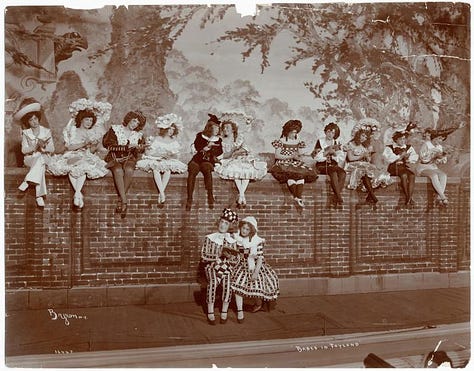
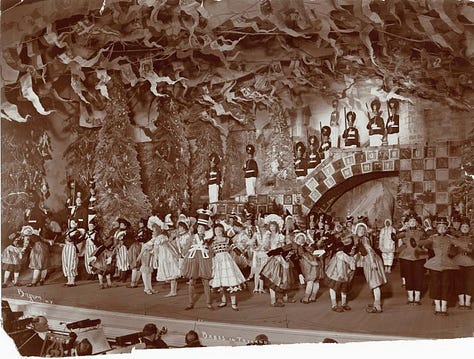
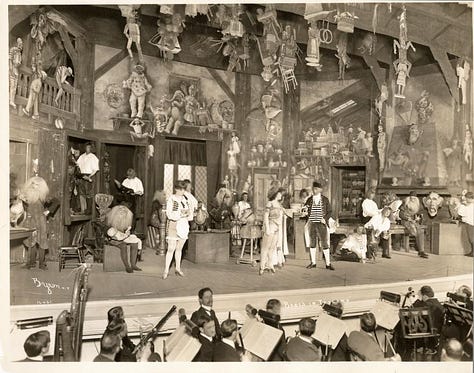
• Back to the March film, I could go on and on and on, as I often do and am apparently in the process of doing again, but a particularly fun little footnote is that the villainous old Silas Barnaby was played by a young actor in his early twenties, billed then as Henry Kleinbach, later known as Henry Brandon, who was eventually, for a number of years, the companion, as we used to put it, of the actor Mark Herron, who was himself, ever so briefly, the fourth and penultimate Mr. Judy Garland. Anyway, here’s young Henry as himself and as Silas Barnaby:


You don’t really think I typo’d in the subtitle, do you?


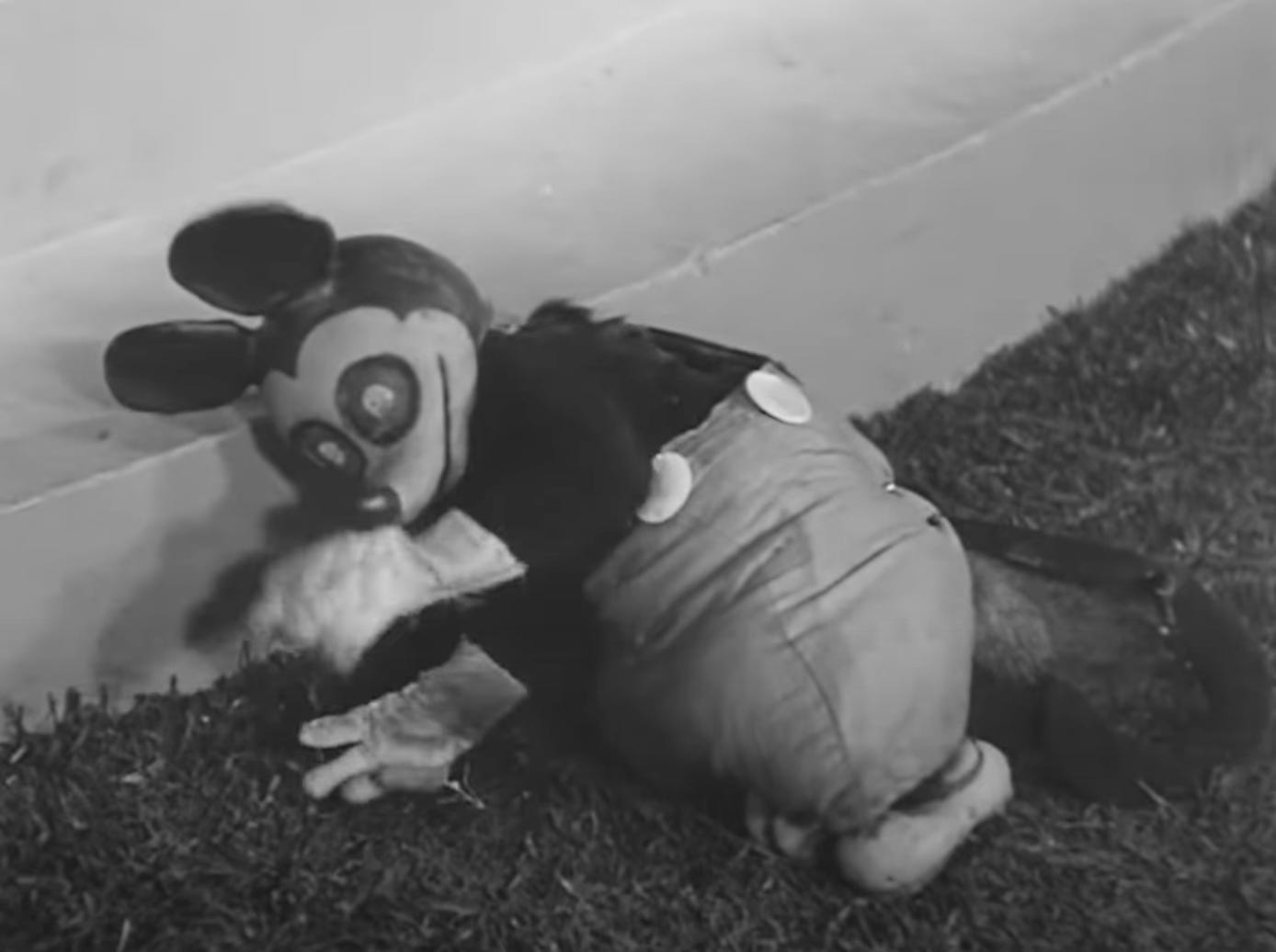



Re: secular
Yep. I've always had this hiccup, too. I've always been able to resolve it by going to "sectarian" ... "Oh, yeah, 'sect', like 'cult' " ... but it annoys me that I have to go through this every time.
I think I just close the browser and sob for the rest of the day if I come across "non-secular."
So Mark Herron was the Larry Fortensky of Peter Allens?